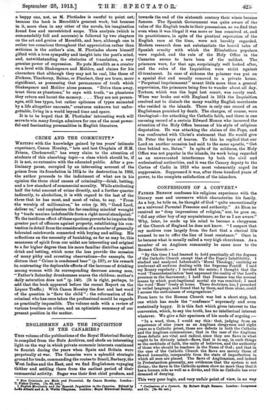CRIME AND THE COMMUNITY.*
WRITING with the knowledge gained by ten years' intimate experience, Canon Horsley, " late and last Chaplain of H.M. Prison, Clerkenwell," has every claim to the attention of students of this absorbing topic—a class which should be, if at is not, co-extensive with the educated public. After a pre- liminary pause, occupied by an interesting account of the prison from its foundation in 1615 to its destruction in 1886, the author proceeds to the indictment of what are in his opinion the three chief causes of criminality—drink, betting, and a low standard of commercial morality. While attributing half the total amount of crime directly, and a further quarter indirectly, to alcoholism, it is with regard to the last of the three that he has most, and most of value, to say. "From the worship of millionaires," he cries (p. 90), " Good Lord, -deliver us," and emphasizes the far-reaching mischief wrought by " trade maxims indefensible from a right moral standpoint." To the insidious effect of these specious proverbs he imputes the greater part of offences against property, establishing his con- tention in detail from the consideration of a number of generally tolerated catchwords connected with buying and selling. His reflections on the necessity of banishing, as far as may be, this meanness of spirit from our midst are interesting and original to a far higher degree than his more familiar diatribes against drink and betting, which none the less provide the occasion of many pithy and arresting observations—for example, the dictum that " Crime is condensed beer" (p.137), or his remark in contrasting the deplorable effects of the increase of drinking among women with its corresponding decrease among men, " Father's Saturday drunkenness scares the children: mother's daily saturation does not" (p. 140). (It is right, perhaps, to ,add that the book appeared before the recent Report on the Liquor Traffic.) With Canon Horsley the first and last word of the question is "Save the child " : the reformation of the criminal who has once taken the professional mould he regards as practically impossible. • The volume ends with a review of various treatises on crime, and an optimistic summary of our present position in the matter.










































 Previous page
Previous page